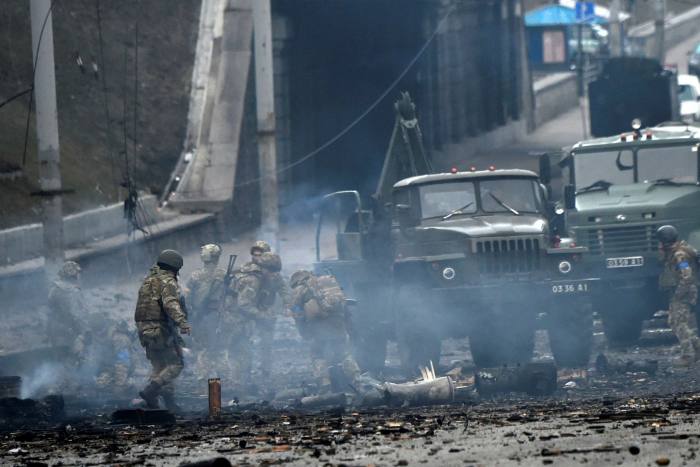As Vladimir Putin launched his military assault on Ukraine, the country’s media censor issued a series of stark warnings. Any outlet that cited sources other than the Kremlin or its armed forces could be banned, even for using the words “attack, invasion, or declaration of war” to describe it.
“We stress that it is Russian official information sources who have accurate and up-to-date information,” the censor Roskomnadzor said.
Such fierce enforcement of the official narrative for the “special military operation” that Russia’s military began in Ukraine on Thursday is part of a huge propaganda barrage accompanying the invasion.
“It’s like a movie. The super commandos are conducting a special military operation and everything is super,” said Tikhon Dzyadko, editor of TV Rain, one of 10 media outlets to be threatened with a ban. “This is all done to make sure that society doesn’t know there’s a real, bloody war going on, so they’re trying to hide information from them as much as possible.”
The campaign builds on a well-oiled machine that has shaped Russians’ perceptions to deliver sound support for previous conflicts in eastern Ukraine and Syria, as well as a brutal crackdown on dissent at home and in neighbouring Belarus.
This time, however, the picture being painted by the Kremlin is so at odds with the reports from Ukraine itself that even top officials and spin-doctors have struggled to handle the cognitive dissonance required.
Putin has framed the war as an operation to liberate Russian speakers in the separatist-controlled Donbas border region — leading news anchors to largely avoid so much as mentioning the fierce battles going on across the rest of Ukraine.
As Ukrainians across the country shelter underground from Russian air strikes, news channels have run footage of peaceful days in Kyiv and repeated the military’s denials that it is launching strikes on populated areas, or even fighting there at all.
“The Ukrainian authorities . . . are in fact waging war with their own population in cities where there are no Russian troops, first and foremost in Kyiv,” said Artyom Sheinin, host of a political talk show on state TV.

The efforts not to mention the war, or even call it one, have left Russian media outgunned by a huge wave of posts by Ukrainians on social networks that they have struggled to counter.
When Russia captured the city of Melitopol on Saturday, it claimed locals had put up no resistance and the elderly had welcomed them by waving red flags. That account was immediately tested by a video on social media showing a man angrily berating troops to their face.
The reality of the conflict even appears to have surprised some of the invading forces themselves. In videos posted by Ukrainians, men said to be Russian soldiers are seen admitting they did not know where they had been sent, with some stuck on the roadside after their vehicles ran out of fuel.
“They live in Putin’s cartoons. They really believe that the population will greet them here and that the military will surrender,” said Kostyantyn Batozsky, a Ukrainian political analyst.
“It’s in the worst Soviet tradition of denying reality: they denied Chernobyl, and exactly the same thing is happening.”
Even some of Putin’s most ardent supporters appear concerned that Russia is struggling to wrest control of the narrative.
“There’s not nearly enough official information,” Alexander Gamov, a veteran reporter for a pro-Putin tabloid, complained to Kremlin spokesman Dmitry Peskov on a Saturday call with reporters.
“It’s just lots of half-baked rumours in the information space, and the official narrative is just drowning. Media are forced to fill that vacuum with Telegram channels and so on,” he said.
Russia began to change tactics on Saturday, after Ukraine claimed it had withstood a fierce night-time assault on Kyiv and its president Volodymyr Zelensky posted social media videos showing himself and top aides still in the capital — in contrast to Putin’s self-imposed seclusion.
State TV abandoned some of its usual weekend programming for special episodes of political talk shows repeating the government line.
On Sheynin’s talk show, analyst Kira Sazonova said Russia’s military had “found themselves in a difficult situation precisely because they have the best intentions . . . to place humanitarianism above military objectives.”
Russia’s struggle to keep control of the war’s story, however, may not necessarily have consequences for Putin’s approval ratings. State television is the primary source of news for four out of five Russians, while the country has begun limiting access to Facebook and Twitter since the invasion began.
In the run-up to the conflict, when Russia repeatedly denied it would invade and mocked western warnings that later turned out to be accurate, the Kremlin’s messaging seemed to have worked.
Sixty per cent of Russians believed the west was the cause of the tensions, 16 per cent blamed Ukraine and only three per cent thought Russia was responsible, according to a poll published on the day of the invasion by the independent Levada Center.
Yet the longer the war goes on, the more Russians’ perception of it may change, said Nikolai Petrov, a senior research fellow at Chatham House.
“All alternative voices have been suppressed, any possibility of organising protests has been destroyed, but that doesn’t mean that the Kremlin can do whatever it wants for as long as it wants,” Petrov said.
“Information about what happens in Ukraine gets passed along from person to person — you can’t shut it off. That’s why they’re counting on it being relatively quick and bloodless in Russians’ eyes,” he added. “But it might turn out totally differently.”

